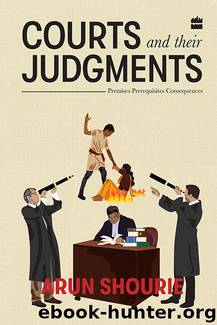Courts and Their Judgments by Arun Shourie

Author:Arun Shourie
Language: eng
Format: epub
Tags: null
Publisher: HarperCollins Publishers India
Published: 2018-05-30T04:00:00+00:00
8
The cascading effect
A feature that strikes one as one sits listening to arguments in a court, as it does when one reads judgments, is that judges consider each issue as an issue in itself – isolated from the context of society, often independently of the consequences that it requires little imagination to see will follow from it. Furthermore, different principles, different encapsulations of a principle impress themselves upon the judges on different occasions.
The consequences of these features taken by themselves would probably be limited to the kind we encountered in the preceding chapter. But another – unpredictable – variable enters the picture. The judgments – for instance, those mandating equality, those striking down disciplinary proceedings because some ingredient of natural justice has not been complied with fully – are not being delivered in a vacuum. They are being delivered in times when rights- mongering and grievance-mongering have become the staples of public discourse. They are being delivered at a time when public life is in the hands of a weak political class. This combination has lethal consequences.
We see this in tectonic issues – the decision of the then government to overturn the Supreme Court’s judgment in the Shah Bano case, and the results that ensued, for instance. We have seen the same thing in the new constitutional amendments by which the opportunity that the Supreme Court gave in Indira Sawhney for beginning to cap reservations has been so firmly sealed. In such instances, the courts gave a way out. But the political class was so weak, it was so much a prisoner of its own ‘progressive’ rhetoric, of vote banks, that it scotched the opportunity. I will first take up one example – that of the Terrorist and Disruptive Activities Act (TADA) – to document what happens as a consequence of this deadly combination. And then illustrate what happens when the two reinforce each other.
A weak political class throws away an essential instrument in spite of the judiciary
TADA was the one law that drove some fear into those who had been harbouring terrorists. It was challenged. A constitution bench of the Supreme Court upheld the constitutional validity of the law. In particular, the Supreme Court specifically upheld the provisions regarding the period of detention, in-camera trials, the provisions that placed the burden of proof on the accused, provisions that allowed transfer of cases from one designated court to another by the Chief Justice of India, etc.
And yet a high-decibel campaign against the Act was triggered in 1993–94, and soon enough this vital instrument was allowed to lapse. How did this happen? I was in touch those days with officials in the Ministry of Home Affairs as well as with people who were in direct combat with the terrorists, and I remember the sequence vividly.
We were at dinner, about fifteen of us. Two newspapers of UP – Dainik Jagran and Amar Ujala – were under assault as a result of a call by the then chief minister, Mulayam Singh. Mr Narendra Mohan, the proprietor of Dainik Jagran joined the gathering.
Download
This site does not store any files on its server. We only index and link to content provided by other sites. Please contact the content providers to delete copyright contents if any and email us, we'll remove relevant links or contents immediately.
American Kingpin by Nick Bilton(3887)
Future Crimes by Marc Goodman(3600)
The Meaning of the Library by unknow(2572)
Inside the Middle East by Avi Melamed(2357)
Why Nations Fail: The Origins of Power, Prosperity, and Poverty by Daron Acemoglu & James Robinson(2297)
On Tyranny by Timothy Snyder(2232)
Living Silence in Burma by Christina Fink(2072)
Putin's Labyrinth(2022)
The Mastermind by Evan Ratliff(1938)
The Smartest Kids in the World by Amanda Ripley(1856)
Think Like a Rocket Scientist by Ozan Varol(1821)
Law: A Very Short Introduction by Raymond Wacks(1748)
It's Our Turn to Eat by Michela Wrong(1731)
The Rule of Law by Bingham Tom(1698)
Philosophy of law a very short introduction by Raymond Wacks(1671)
Leadership by Doris Kearns Goodwin(1641)
A Dirty War by Anna Politkovskaya(1633)
Information and Communications Security by Jianying Zhou & Xiapu Luo & Qingni Shen & Zhen Xu(1621)
Civil Procedure (Aspen Casebooks) by Stephen C. Yeazell(1557)
